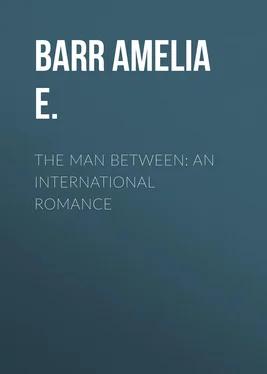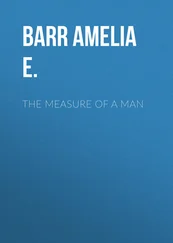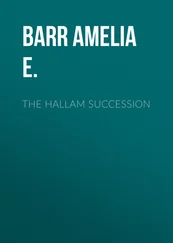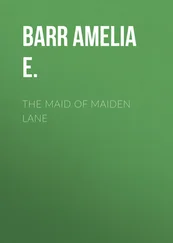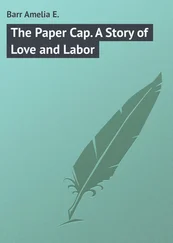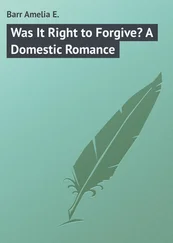Amelia Barr - The Man Between - An International Romance
Здесь есть возможность читать онлайн «Amelia Barr - The Man Between - An International Romance» — ознакомительный отрывок электронной книги совершенно бесплатно, а после прочтения отрывка купить полную версию. В некоторых случаях можно слушать аудио, скачать через торрент в формате fb2 и присутствует краткое содержание. Жанр: foreign_prose, foreign_antique, на английском языке. Описание произведения, (предисловие) а так же отзывы посетителей доступны на портале библиотеки ЛибКат.
- Название:The Man Between: An International Romance
- Автор:
- Жанр:
- Год:неизвестен
- ISBN:нет данных
- Рейтинг книги:4 / 5. Голосов: 1
-
Избранное:Добавить в избранное
- Отзывы:
-
Ваша оценка:
- 80
- 1
- 2
- 3
- 4
- 5
The Man Between: An International Romance: краткое содержание, описание и аннотация
Предлагаем к чтению аннотацию, описание, краткое содержание или предисловие (зависит от того, что написал сам автор книги «The Man Between: An International Romance»). Если вы не нашли необходимую информацию о книге — напишите в комментариях, мы постараемся отыскать её.
The Man Between: An International Romance — читать онлайн ознакомительный отрывок
Ниже представлен текст книги, разбитый по страницам. Система сохранения места последней прочитанной страницы, позволяет с удобством читать онлайн бесплатно книгу «The Man Between: An International Romance», без необходимости каждый раз заново искать на чём Вы остановились. Поставьте закладку, и сможете в любой момент перейти на страницу, на которой закончили чтение.
Интервал:
Закладка:
“English, you mean?”
“No. Yorkshire IS England to grandmother and father. They don’t think anything much of the other counties, and people from them are just respectable foreigners. You may depend upon it, whatever grandmother says of Mr. Fred Mostyn, father will believe it, too.”
“Your father always believes whatever your grandmother says. Good night, dear.”
“Good night. I think I shall go to grandmother in the morning. I know how to manage her. I shall meet her squarely with the truth, and acknowledge that I am dying with curiosity about Mr. Mostyn.”
“And she will tease and lecture you, say you are ‘not sweetheart high yet, only a little maid,’ and so on. Far better go and talk with Dora. To-morrow she will need you, I am sure. Ethel, I am very sleepy. Good night again, dear.”
“Good night!” Then with a sudden animation, “I know what to do, I shall tell grandmother about Dora’s marriage. It is all plain enough now. Good night, Ruth.” And this good night, though dropping sweetly into the minor third, had yet on its final inflection something of the pleasant hopefulness of its major key—it expressed anticipation and satisfaction.
What happened in the night session she could not tell, but she awoke with a positive disinclination to ask a question about Mr. Mostyn. “I have received orders from some one,” she said to Ruth; “I simply do not care whether I ever see or hear of the man again. I am going to Dora, and I may not come home until late. You know they will depend upon me for every suggestion.”
In fact, Ethel did not return home until the following day, for a snowstorm came up in the afternoon, and the girl was weary with planning and writing, and well inclined to eat with Dora the delicate little dinner served to them in Dora’s private parlor. Then about nine o’clock Mr. Stanhope called, and Ethel found it pleasant enough to watch the lovers and listen to Mrs. Denning’s opinions of what had been already planned. And the next day she seemed to be so absolutely necessary to the movement of the marriage preparations, that it was nearly dark before she was permitted to return home.
It was but a short walk between the two houses, and Ethel was resolved to have the refreshment of the exercise. And how good it was to feel the pinch of the frost and the gust of the north wind, and after it to come to the happy portal of home, and the familiar atmosphere of the cheerful hall, and then to peep into the firelit room in which Ruth lay dreaming in the dusky shadows.
“Ruth, darling!”
“Ethel! I have just sent for you to come home.” Then she rose and took Ethel in her arms. “How delightfully cold you are! And what rosy cheeks! Do you know that we have a little dinner party?”
“Mr. Mostyn?”
“Yes, and your grandmother, and perhaps Dr. Fisher—the Doctor is not certain.”
“And I see that you are already dressed. How handsome you look! That black lace dress, with the dull gold ornaments, is all right.”
“I felt as if jewels would be overdress for a family dinner.”
“Yes, but jewels always snub men so completely. It is not altogether that they represent money; they give an air of royalty, and a woman without jewels is like an uncrowned queen—she does not get the homage. I can’t account for it, but there it is. I shall wear my sapphire necklace. What did father say about our new kinsman?”
“Very little. It was impossible to judge from his words what he thought. I fancied that he might have been a little disappointed.”
“I should not wonder. We shall see.”
“You will be dressed in an hour?”
“In less time. Shall I wear white or blue?”
“Pale blue and white flowers. There are some white violets in the library. I have a red rose. We shall contrast each other very well.”
“What is it all about? Do we really care how we look in the eyes of this Mr. Mostyn?”
“Of course we care. We should not be women if we did not care. We must make some sort of an impression, and naturally we prefer that it should be a pleasant one.”
“If we consider the mortgage–”
“Nonsense! The mortgage is not in it.”
“Good-by. Tell Mattie to bring me a cup of tea upstairs. I will be dressed in an hour.”
The tea was brought and drank, and Ethel fell asleep while her maid prepared every item for her toilet. Then she spoke to her mistress, and Ethel awakened, as she always did, with a smile; nature’s surest sign of a radically sweet temper. And everything went in accord with the smile; her hair fell naturally into its most becoming waves, her dress into its most graceful folds; the sapphire necklace matched the blue of her happy eyes, the roses of youth were on her cheeks, and white violets on her breast. She felt her own beauty and was glad of it, and with a laughing word of pleasure went down to the parlor.
Madam Rawdon was standing before the fire, but when she heard the door open she turned her face toward it.
“Come here, Ethel Rawdon,” she said, “and let me have a look at you.” And Ethel went to her side, laid her hand lightly on the old lady’s shoulder and kissed her cheek. “You do look middling well,” she continued, “and your dress is about as it should be. I like a girl to dress like a girl—still, the sapphires. Are they necessary?”
“You would not say corals, would you, grandmother? I have those you gave me when I was three years old.”
“Keep your wit, my dear, for this evening. I should not wonder but you might need it. Fred Mostyn is rather better than I expected. It was a great pleasure to see him. It was like a bit of my own youth back again. When you are a very old woman there are few things sweeter, Ethel.”
“But you are not an old woman, grandmother.”
Nor was she. In spite of her seventy-five years she stood erect at the side of her grand-daughter. Her abundant hair was partly gray, but the gray mingled with the little oval of costly lace that lay upon it, and the effect was soft and fair as powdering. She had been very handsome, and her beauty lingered as the beauty of some flowers linger, in fainter tints and in less firm outlines; for she had never fallen from that “grace of God vouchsafed to children,” and therefore she had kept not only the enthusiasms of her youth, but that sweet promise of the “times of restitution” when the child shall die one hundred years old, because the child-heart shall be kept in all its freshness and trust. Yes, in Rachel Rawdon’s heart the well-springs of love and life lay too deep for the frosts of age to touch. She would be eternally young before she grew old.
She sat down as Ethel spoke, and drew the girl to her side. “I hear your friend is going to marry,” she said.
“Dora? Yes.”
“Are you sorry?”
“Perhaps not. Dora has been a care to me for four years. I hope her husband may manage her as well as I have done.”
“Are you afraid he will not?”
“I cannot tell, grandmother. I see all Dora’s faults. Mr. Stanhope is certain that she has no faults. Hitherto she has had her own way in everything. Excepting myself, no one has ventured to contradict her. But, then, Dora is over head and ears in love, and love, it is said, makes all things easy to bear and to do.”
“One thing, girls, amazes me—it is how readily women go to church and promise to love, honor, and obey their husbands, when they never intend to do anything of the kind.”
“There is a still more amazing thing, Madam,” answered Ruth; “that is that men should be so foolish as to think, or hope, they perhaps might do so.”
“Old-fashioned women used to manage it some way or other, Ruth. But the old-fashioned woman was a very soft-hearted creature, and, maybe, it was just as well that she was.”
Читать дальшеИнтервал:
Закладка:
Похожие книги на «The Man Between: An International Romance»
Представляем Вашему вниманию похожие книги на «The Man Between: An International Romance» списком для выбора. Мы отобрали схожую по названию и смыслу литературу в надежде предоставить читателям больше вариантов отыскать новые, интересные, ещё непрочитанные произведения.
Обсуждение, отзывы о книге «The Man Between: An International Romance» и просто собственные мнения читателей. Оставьте ваши комментарии, напишите, что Вы думаете о произведении, его смысле или главных героях. Укажите что конкретно понравилось, а что нет, и почему Вы так считаете.
